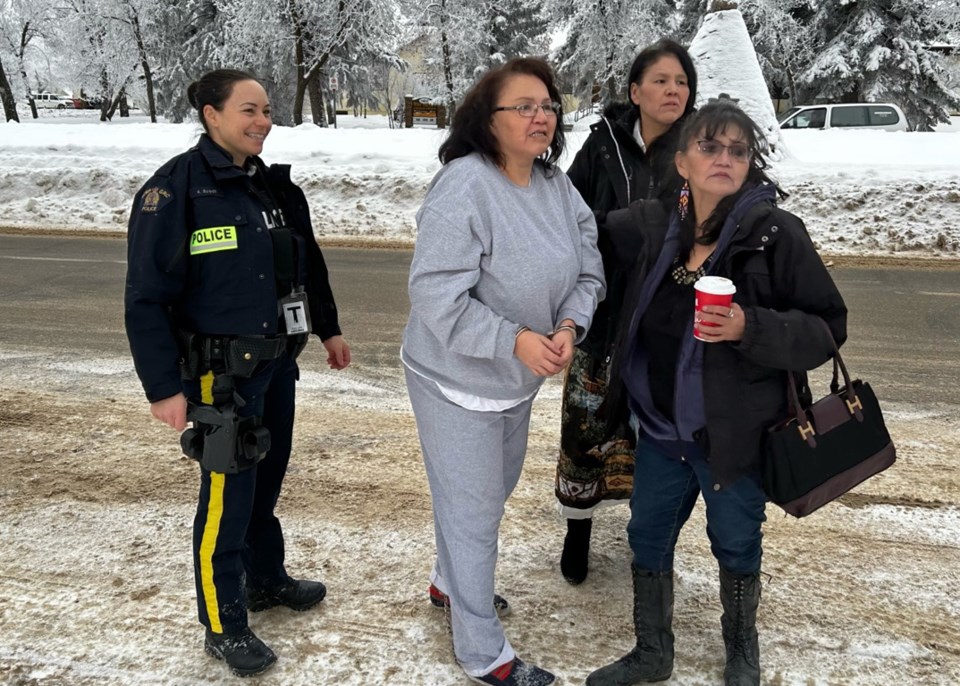YORKTON – The second day of a bail hearing for two sisters convicted of a 1994 murder began with arguments from both the Crown and defence lawyers.
The morning began with an exploration of similar case law where people had been eligible for parole and the results after a minister’s decision. Justice Donald Layh noted how this is a unique case where two individuals are eligible for parole, but have a history of breach offences. In the first day of the hearing, Crown Prosecutor Kelly Kaip explored both Nerissa and Odelia’s past criminal record, noting various breaches of parole throughout the timelines. This was an effort to highlight the Crown’s position against release of the Quewezance sisters entirely.
Court heard that future parole eligibility for Nerissa would not occur until next year, while Odelia had full parole denied during a recent hearing - but her day parole was extended for another six months.
In presenting his arguments, James Lockyer, lawyer for the sisters, focussed on the reliability of confessions made by Nerissa and Odelia while in police custody, and the conditions they experienced during the arrest and subsequent transport to the Pine Grove Correctional Centre back in 1993. Instead of taking the women to the institution in a timely manner, Lockyer noted police in Kamsack “ignored” a court order by holding the Quewezance’s in cells for four days.
“It tells us the attitudes they were encountering in a police station full of white men,” Lockyer said, noting the difference in general attitudes toward Indigenous individuals in the early 1990s.
After referencing further relevant examples from case law, Lockyer noted the current release hearing ought to be viewed through 2023 eyes instead of relying on confessions obtained through “circumstances that today, we would not allow” as they were 30 years ago. At issue, according to Lockyer, is how reliable the confessions provided by the sisters were at that time, drawing from how vulnerable people have been known to make false confessions.
“We want to engage the services of a forced confessions expert to review these confessions,” Lockyer said, adding that after such a professional meets with Odelia and Nerissa, plus examining the confessions they gave, and opinion on their relevance could be made, “if these confessions are actually real.”
“This case tells us a lot about truth and reconciliation,” Lockyer said in his conclusion, calling for the release of the sisters.
Next to present was lawyer Deanna Harris, who outlined the conditions the sisters would abide by in their release. She noted that they’re urging the court not to impose conditions such as a curfew, or drug and alcohol prohibition, rather to instate “…conditions that would support them in their recovery and build on their strengths.”
The minimal conditions sought by defence include residing with people who can provide an assurity, and accessing community and family supports. Odelia would reside with her husband and children with the Yorkton Tribal Council offering counselling and possible employment. Nerissa would reside in a home with Vice Chief of the Congress of Aboriginal Peoples Kim Beaudin and his family - an environment with many years of assisting vulnerable people. She would have the support of the Saskatoon Tribal Council with VC Allyson Bear as a personal point of contact. Nerissa would also have access to programming, counselling and volunteer opportunities. Both sisters would also have access to supports from Innocence Canada.
Jerome Kennedy, another lawyer representing the sisters, explained how Innocence Canada operates and advocates for wrongfully convicted individuals. He also questioned the relevance of having the Quewezance sisters continue incarceration while waiting for the ministerial review process.
“If they’re denied application for release, they will spend another three to four years in jail or on parole,” he said, adding it’s not in the public interest that the women lose more years of their life in jail or on parole. “This is not theory, it is the reality of the process.”
Added to the time waiting for the ministerial review process and ultimate report, Kennedy noted there are inherent “delays within that delay” as it will take time to process and respond to the information presented.
Court will hear arguments presented by the Crown this afternoon.
— Click for more from Crime, Cops and Court.





